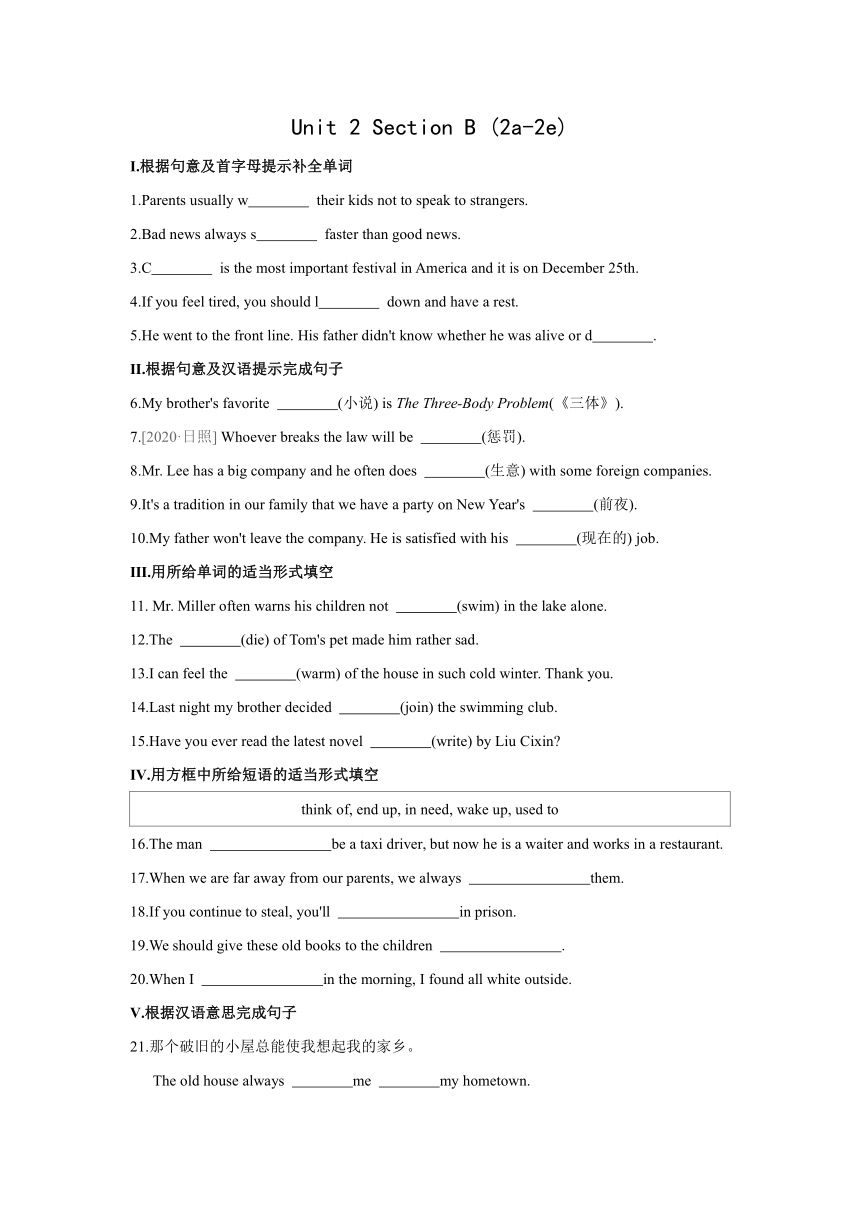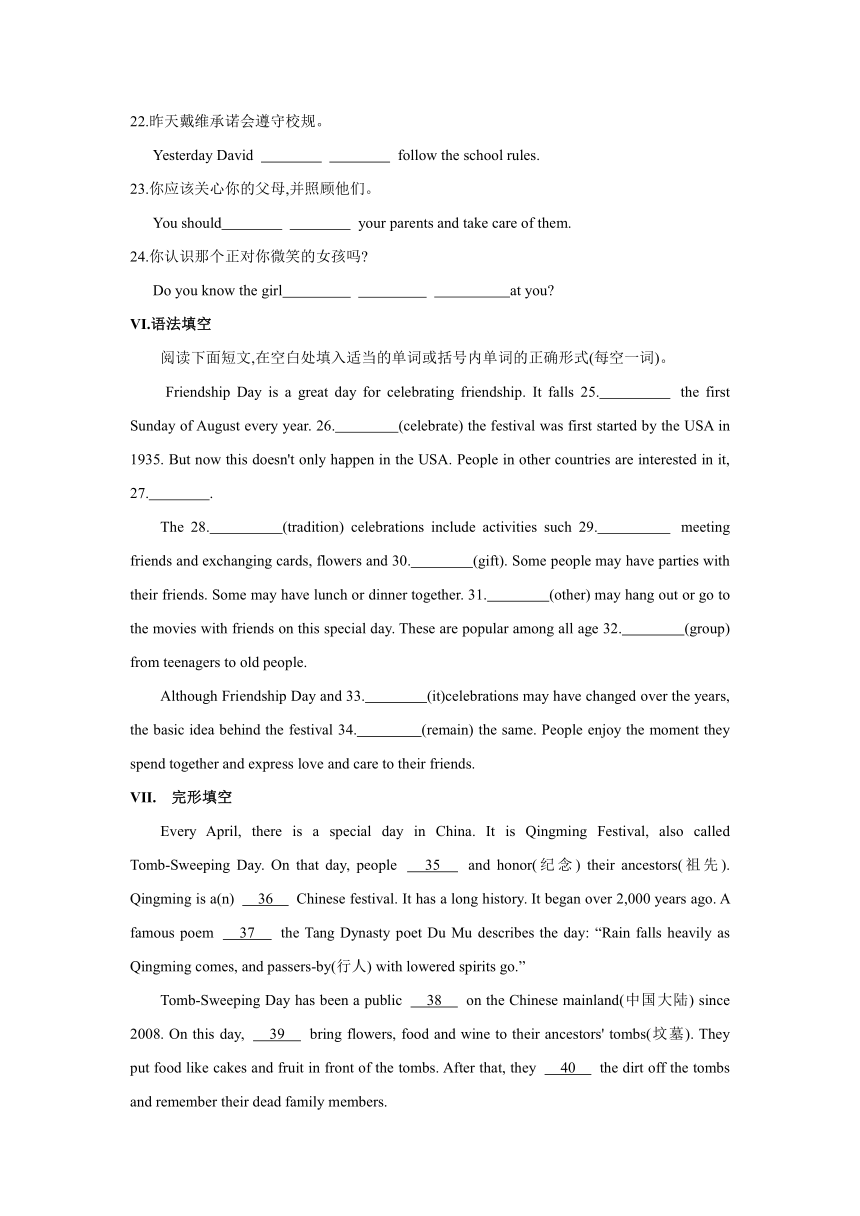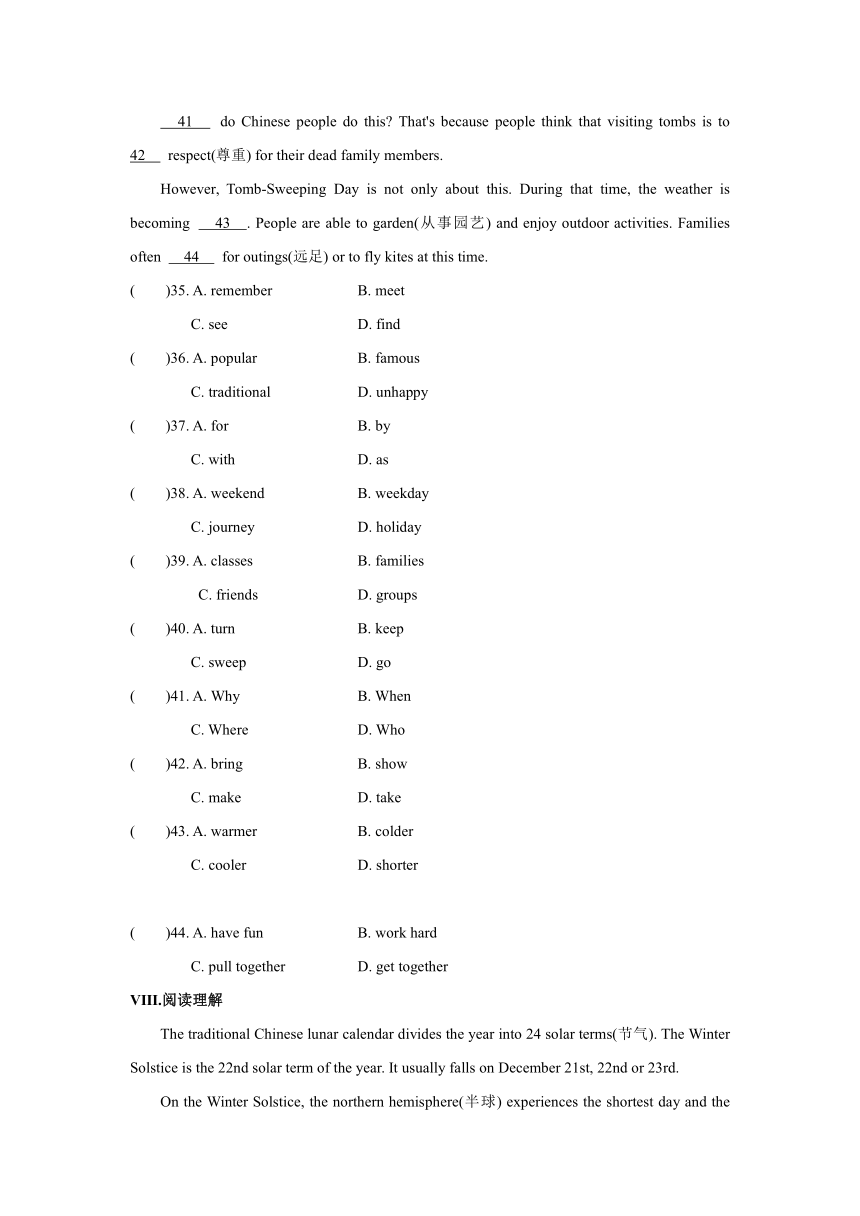九年级英语Unit 2 I think that mooncakes are delicious! Section B (2a-2e) 同步练习(含答案)
文档属性
| 名称 | 九年级英语Unit 2 I think that mooncakes are delicious! Section B (2a-2e) 同步练习(含答案) |  | |
| 格式 | zip | ||
| 文件大小 | 43.9KB | ||
| 资源类型 | 教案 | ||
| 版本资源 | 人教新目标(Go for it)版 | ||
| 科目 | 英语 | ||
| 更新时间 | 2021-07-29 10:53:06 | ||
图片预览



文档简介
Unit
2
Section
B
(2a-2e)
Ⅰ.根据句意及首字母提示补全单词
1.Parents
usually
w
their
kids
not
to
speak
to
strangers.
?
2.Bad
news
always
s
faster
than
good
news.
?
3.C
is
the
most
important
festival
in
America
and
it
is
on
December
25th.?
4.If
you
feel
tired,
you
should
l
down
and
have
a
rest.?
5.He
went
to
the
front
line.
His
father
didn't
know
whether
he
was
alive
or
d .?
Ⅱ.根据句意及汉语提示完成句子
6.My
brother's
favorite
(小说)
is
The
Three-Body
Problem(《三体》).
?
7.[2020·日照]
Whoever
breaks
the
law
will
be
(惩罚).
?
8.Mr.
Lee
has
a
big
company
and
he
often
does
(生意)
with
some
foreign
companies.
?
9.It's
a
tradition
in
our
family
that
we
have
a
party
on
New
Year's
(前夜).
?
10.My
father
won't
leave
the
company.
He
is
satisfied
with
his
(现在的)
job.
?
Ⅲ.用所给单词的适当形式填空
11.
Mr.
Miller
often
warns
his
children
not
(swim)
in
the
lake
alone.?
12.The
(die)
of
Tom's
pet
made
him
rather
sad.?
13.I
can
feel
the
(warm)
of
the
house
in
such
cold
winter.
Thank
you.?
14.Last
night
my
brother
decided
(join)
the
swimming
club.?
15.Have
you
ever
read
the
latest
novel
(write)
by
Liu
Cixin??
Ⅳ.用方框中所给短语的适当形式填空
think
of,
end
up,
in
need,
wake
up,
used
to
16.The
man
be
a
taxi
driver,
but
now
he
is
a
waiter
and
works
in
a
restaurant.?
17.When
we
are
far
away
from
our
parents,
we
always
them.?
18.If
you
continue
to
steal,
you'll
in
prison.
?
19.We
should
give
these
old
books
to
the
children
.
?
20.When
I
in
the
morning,
I
found
all
white
outside.?
Ⅴ.根据汉语意思完成句子
21.那个破旧的小屋总能使我想起我的家乡。
The
old
house
always
me
my
hometown.?
22.昨天戴维承诺会遵守校规。
Yesterday
David
follow
the
school
rules.?
23.你应该关心你的父母,并照顾他们。
You
should
your
parents
and
take
care
of
them.?
24.你认识那个正对你微笑的女孩吗?
Do
you
know
the
girl
at
you??
Ⅵ.语法填空
阅读下面短文,在空白处填入适当的单词或括号内单词的正确形式(每空一词)。
Friendship
Day
is
a
great
day
for
celebrating
friendship.
It
falls
25.
the
first
Sunday
of
August
every
year.
26. (celebrate)
the
festival
was
first
started
by
the
USA
in
1935.
But
now
this
doesn't
only
happen
in
the
USA.
People
in
other
countries
are
interested
in
it,
27. .?
The
28. (tradition)
celebrations
include
activities
such
29.
meeting
friends
and
exchanging
cards,
flowers
and
30. (gift).
Some
people
may
have
parties
with
their
friends.
Some
may
have
lunch
or
dinner
together.
31. (other)
may
hang
out
or
go
to
the
movies
with
friends
on
this
special
day.
These
are
popular
among
all
age
32. (group)
from
teenagers
to
old
people.?
Although
Friendship
Day
and
33. (it)celebrations
may
have
changed
over
the
years,
the
basic
idea
behind
the
festival
34. (remain)
the
same.
People
enjoy
the
moment
they
spend
together
and
express
love
and
care
to
their
friends.?
Ⅶ.
完形填空
Every
April,
there
is
a
special
day
in
China.
It
is
Qingming
Festival,
also
called
Tomb-Sweeping
Day.
On
that
day,
people
35
and
honor(纪念)
their
ancestors(祖先).
Qingming
is
a(n)
36
Chinese
festival.
It
has
a
long
history.
It
began
over
2,000
years
ago.
A
famous
poem
37
the
Tang
Dynasty
poet
Du
Mu
describes
the
day:
“Rain
falls
heavily
as
Qingming
comes,
and
passers-by(行人)
with
lowered
spirits
go.”?
Tomb-Sweeping
Day
has
been
a
public
38
on
the
Chinese
mainland(中国大陆)
since
2008.
On
this
day,
39
bring
flowers,
food
and
wine
to
their
ancestors'
tombs(坟墓).
They
put
food
like
cakes
and
fruit
in
front
of
the
tombs.
After
that,
they
40
the
dirt
off
the
tombs
and
remember
their
dead
family
members.
?
41
do
Chinese
people
do
this?
That's
because
people
think
that
visiting
tombs
is
to
42
respect(尊重)
for
their
dead
family
members.
?
However,
Tomb-Sweeping
Day
is
not
only
about
this.
During
that
time,
the
weather
is
becoming
43 .
People
are
able
to
garden(从事园艺)
and
enjoy
outdoor
activities.
Families
often
44
for
outings(远足)
or
to
fly
kites
at
this
time.
?
( )35.
A.
remember
B.
meet
C.
see
D.
find
( )36.
A.
popular
B.
famous
C.
traditional
D.
unhappy
( )37.
A.
for
B.
by
C.
with
D.
as
( )38.
A.
weekend
B.
weekday
C.
journey
D.
holiday
( )39.
A.
classes
B.
families
C.
friends
D.
groups
( )40.
A.
turn
B.
keep
C.
sweep
D.
go
( )41.
A.
Why
B.
When
C.
Where
D.
Who
( )42.
A.
bring
B.
show
C.
make
D.
take
( )43.
A.
warmer
B.
colder
C.
cooler
D.
shorter
( )44.
A.
have
fun
B.
work
hard
C.
pull
together
D.
get
together
Ⅷ.阅读理解
The
traditional
Chinese
lunar
calendar
divides
the
year
into
24
solar
terms(节气).
The
Winter
Solstice
is
the
22nd
solar
term
of
the
year.
It
usually
falls
on
December
21st,
22nd
or
23rd.
On
the
Winter
Solstice,
the
northern
hemisphere(半球)
experiences
the
shortest
day
and
the
longest
night
in
the
year.
From
then
on,
the
days
become
longer
and
the
nights
become
shorter.
It
also
marks
the
arrival
of
the
coldest
season
in
the
year.
There
was
a
saying
in
ancient
China,
“The
Winter
Solstice
is
as
important
as
the
Spring
Festival.”
The
Winter
Solstice
became
a
winter
festival
during
the
Han
Dynasty(202
BC-220
AD).
On
this
day,
both
officials
and
common
people
would
have
a
rest.
Here
are
some
foods
people
enjoy
on
the
Winter
Solstice.
Eating
dumplings
and
tangyuan
During
the
Winter
Solstice
in
North
China,
people
like
eating
dumplings.
In
southern
China
and
Taiwan,
people
will
eat
tangyuan.
Eating
wontons(馄饨)
People
in
Suzhou,
Jiangsu
eat
wontons
on
the
Winter
Solstice.
According
to
an
old
story,
during
the
midwinter
feast(冬至宴会)
2,500
years
ago,
the
King
of
Wu
was
disgusted
with
all
kinds
of
costly(昂贵的)
foods
and
wanted
to
eat
something
different.
Then,
the
beauty
Xishi
came
into
the
kitchen
to
make
“wontons”.
The
king
ate
a
lot
and
liked
the
food
very
much.
To
remember
Xishi,
the
people
of
Suzhou
made
wontons
to
celebrate
the
festival.?
Having
mutton
soup
In
Yinchuan,
Ningxia
people
call
midwinter
the
“Ghost
Festival”.
On
that
day
people
there
eat
mutton
soup
with
dumplings
in
it.
They
give
the
midwinter
soup
a
strange
name—“brain”,
and
share
it
with
their
neighbors.
Eating
rice
cakes
During
the
Winter
Solstice,
people
in
Hangzhou
traditionally
eat
rice
cakes.
In
the
past,
before
the
Winter
Solstice
came,
every
family
would
make
the
cakes.
Today,
though
fewer
families
eat
home-made
cakes,
people
there
still
buy
rice
cakes
for
the
Winter
Solstice.
( )45.In
China
the
Winter
Solstice
became
a
winter
festival
about
years
ago.?
A.2,700
B.2,600
C.2,000
D.1,500
( )46.Which
of
the
following
can
best
replace
the
underlined
word
“disgusted”
?
A.Interested.
B.Hungry.
C.Famous.
D.Bored.
( )47.The
traditional
food
on
the
Winter
Solstice
in
Suzhou,
Jiangsu
is
.?
A.dumplings
B.wontons
C.mutton
soup
D.rice
cakes
( )48.What
is
the
best
title
for
the
passage?
A.The
Celebration
of
the
Winter
Solstice
B.The
History
of
the
Winter
Solstice
C.The
Winter
Solstice
in
China
D.Traditional
Foods
on
the
Winter
Solstice
答案
Ⅰ.1.warn 2.spreads 3.Christmas
4.lie 5.dead
Ⅱ.6.novel 7.punished 8.business
9.Eve 10.present
Ⅲ.11.to
swim 12.death
13.warmth 14.to
join
15.written
Ⅳ.16.used
to 17.think
of 18.end
up
19.in
need 20.woke
up
Ⅴ.21.reminds;
of 22.promised
to
23.care
about 24.who/that
is
smiling
Ⅵ.25.on 26.Celebrating 27.too
28.traditional 29.as 30.gifts
31.Others 32.groups 33.its
34.remains
Ⅶ.【主旨大意】
本文是一篇说明文。这篇短文介绍了中国的一个传统节日——清明节。清明节又叫扫墓节,因为在这一天,家人们通常会到祖先的坟墓上去祭祀、打扫。现在清明节已经是我们国家的一个公共假期了,那个时候天气也比较暖和,所以家人们经常聚在一起去郊游或者放风筝。
35.A 36.C
37.B 考查介词的词义辨析。句意:唐朝的一位著名的诗人杜牧这样描述这一天:清明时节雨纷纷,路上行人欲断魂。表示“由某人所写”,应用介词by。故选B。
38.D 考查名词的词义辨析。句意:自从2008年,扫墓节在中国大陆就成了一个公共假期。weekend意为“周末”;
weekday意为“工作日”;journey意为“旅行”;holiday意为“假期”。清明节不一定是在周末或者是工作日,但是从2008年开始,这个节日成了一个公共的假期,故选D。
39.B
40.C 考查动词的用法辨析。句意:在那之后,他们打扫坟墓上的尘土,怀念他们去世的亲人。根据这个节日的名称Tomb-Sweeping
Day可知,扫墓节就是去祖先的坟墓打扫,故选C。
41.A 考查疑问词的词义辨析。句意:为什么中国人要这样做?根据“That's
because…”可知下文解释了中国人为什么要为祖先扫墓。故选A。
42.B 考查动词的用法辨析。句意:那是因为人们认为在清明节扫墓是向死去的亲人表示尊重的一种方式。show
respect
for是固定短语,意为“对……表示尊重”。故选B。
43.A 考查形容词的词义辨析。句意:在那个时候,天气变得更暖和了。根据文意可知,清明节一般在四月份,那时候春天已经来了,天气变得越来越暖和。故选A。
44.D 考查动词短语的词义辨析。句意:在这个时候家人们经常聚在一起外出郊游或放风筝。have
fun意为“玩得开心”;work
hard意为“努力学习”;pull
together意为“齐心协力”;get
together意为“聚在一起”。根据句意可知,家人们聚在一起郊游或放风筝。故选D。
Ⅷ.【主旨大意】
本文介绍了二十四节气中的第22个节气——冬至,包括冬至的自然现象、冬至的起源及全国各地的人们在冬至这天的传统食物。
45.C 推理判断题。由第三段中的“The
Winter
Solstice
became
a
winter
festival
during
the
Han
Dynasty
(202
BC-220
AD).”可知,冬至成为一个节日是在汉代,汉朝的起止时间是公元前202年到公元220年。故判断,在中国冬至成为节日大约是在2000年以前。
46.D 词义猜测题。由本句的“wanted
to
eat
something
different”可知,吴王想吃不一样的东西。故判断他厌倦各种昂贵的食物,想尝试不同的东西。因此判断disgusted在此和bored意思最为接近。故选D。
47.B 细节理解题。由文中的“People
in
Suzhou,
Jiangsu
eat
wontons
on
the
Winter
Solstice.”可知,苏州人冬至的传统食物是馄饨。
48.C 主旨大意题。本文主要介绍冬至节气的时间、自然现象、成为节日的时间及中国各地冬至的传统美食。故选C。
2
Section
B
(2a-2e)
Ⅰ.根据句意及首字母提示补全单词
1.Parents
usually
w
their
kids
not
to
speak
to
strangers.
?
2.Bad
news
always
s
faster
than
good
news.
?
3.C
is
the
most
important
festival
in
America
and
it
is
on
December
25th.?
4.If
you
feel
tired,
you
should
l
down
and
have
a
rest.?
5.He
went
to
the
front
line.
His
father
didn't
know
whether
he
was
alive
or
d .?
Ⅱ.根据句意及汉语提示完成句子
6.My
brother's
favorite
(小说)
is
The
Three-Body
Problem(《三体》).
?
7.[2020·日照]
Whoever
breaks
the
law
will
be
(惩罚).
?
8.Mr.
Lee
has
a
big
company
and
he
often
does
(生意)
with
some
foreign
companies.
?
9.It's
a
tradition
in
our
family
that
we
have
a
party
on
New
Year's
(前夜).
?
10.My
father
won't
leave
the
company.
He
is
satisfied
with
his
(现在的)
job.
?
Ⅲ.用所给单词的适当形式填空
11.
Mr.
Miller
often
warns
his
children
not
(swim)
in
the
lake
alone.?
12.The
(die)
of
Tom's
pet
made
him
rather
sad.?
13.I
can
feel
the
(warm)
of
the
house
in
such
cold
winter.
Thank
you.?
14.Last
night
my
brother
decided
(join)
the
swimming
club.?
15.Have
you
ever
read
the
latest
novel
(write)
by
Liu
Cixin??
Ⅳ.用方框中所给短语的适当形式填空
think
of,
end
up,
in
need,
wake
up,
used
to
16.The
man
be
a
taxi
driver,
but
now
he
is
a
waiter
and
works
in
a
restaurant.?
17.When
we
are
far
away
from
our
parents,
we
always
them.?
18.If
you
continue
to
steal,
you'll
in
prison.
?
19.We
should
give
these
old
books
to
the
children
.
?
20.When
I
in
the
morning,
I
found
all
white
outside.?
Ⅴ.根据汉语意思完成句子
21.那个破旧的小屋总能使我想起我的家乡。
The
old
house
always
me
my
hometown.?
22.昨天戴维承诺会遵守校规。
Yesterday
David
follow
the
school
rules.?
23.你应该关心你的父母,并照顾他们。
You
should
your
parents
and
take
care
of
them.?
24.你认识那个正对你微笑的女孩吗?
Do
you
know
the
girl
at
you??
Ⅵ.语法填空
阅读下面短文,在空白处填入适当的单词或括号内单词的正确形式(每空一词)。
Friendship
Day
is
a
great
day
for
celebrating
friendship.
It
falls
25.
the
first
Sunday
of
August
every
year.
26. (celebrate)
the
festival
was
first
started
by
the
USA
in
1935.
But
now
this
doesn't
only
happen
in
the
USA.
People
in
other
countries
are
interested
in
it,
27. .?
The
28. (tradition)
celebrations
include
activities
such
29.
meeting
friends
and
exchanging
cards,
flowers
and
30. (gift).
Some
people
may
have
parties
with
their
friends.
Some
may
have
lunch
or
dinner
together.
31. (other)
may
hang
out
or
go
to
the
movies
with
friends
on
this
special
day.
These
are
popular
among
all
age
32. (group)
from
teenagers
to
old
people.?
Although
Friendship
Day
and
33. (it)celebrations
may
have
changed
over
the
years,
the
basic
idea
behind
the
festival
34. (remain)
the
same.
People
enjoy
the
moment
they
spend
together
and
express
love
and
care
to
their
friends.?
Ⅶ.
完形填空
Every
April,
there
is
a
special
day
in
China.
It
is
Qingming
Festival,
also
called
Tomb-Sweeping
Day.
On
that
day,
people
35
and
honor(纪念)
their
ancestors(祖先).
Qingming
is
a(n)
36
Chinese
festival.
It
has
a
long
history.
It
began
over
2,000
years
ago.
A
famous
poem
37
the
Tang
Dynasty
poet
Du
Mu
describes
the
day:
“Rain
falls
heavily
as
Qingming
comes,
and
passers-by(行人)
with
lowered
spirits
go.”?
Tomb-Sweeping
Day
has
been
a
public
38
on
the
Chinese
mainland(中国大陆)
since
2008.
On
this
day,
39
bring
flowers,
food
and
wine
to
their
ancestors'
tombs(坟墓).
They
put
food
like
cakes
and
fruit
in
front
of
the
tombs.
After
that,
they
40
the
dirt
off
the
tombs
and
remember
their
dead
family
members.
?
41
do
Chinese
people
do
this?
That's
because
people
think
that
visiting
tombs
is
to
42
respect(尊重)
for
their
dead
family
members.
?
However,
Tomb-Sweeping
Day
is
not
only
about
this.
During
that
time,
the
weather
is
becoming
43 .
People
are
able
to
garden(从事园艺)
and
enjoy
outdoor
activities.
Families
often
44
for
outings(远足)
or
to
fly
kites
at
this
time.
?
( )35.
A.
remember
B.
meet
C.
see
D.
find
( )36.
A.
popular
B.
famous
C.
traditional
D.
unhappy
( )37.
A.
for
B.
by
C.
with
D.
as
( )38.
A.
weekend
B.
weekday
C.
journey
D.
holiday
( )39.
A.
classes
B.
families
C.
friends
D.
groups
( )40.
A.
turn
B.
keep
C.
sweep
D.
go
( )41.
A.
Why
B.
When
C.
Where
D.
Who
( )42.
A.
bring
B.
show
C.
make
D.
take
( )43.
A.
warmer
B.
colder
C.
cooler
D.
shorter
( )44.
A.
have
fun
B.
work
hard
C.
pull
together
D.
get
together
Ⅷ.阅读理解
The
traditional
Chinese
lunar
calendar
divides
the
year
into
24
solar
terms(节气).
The
Winter
Solstice
is
the
22nd
solar
term
of
the
year.
It
usually
falls
on
December
21st,
22nd
or
23rd.
On
the
Winter
Solstice,
the
northern
hemisphere(半球)
experiences
the
shortest
day
and
the
longest
night
in
the
year.
From
then
on,
the
days
become
longer
and
the
nights
become
shorter.
It
also
marks
the
arrival
of
the
coldest
season
in
the
year.
There
was
a
saying
in
ancient
China,
“The
Winter
Solstice
is
as
important
as
the
Spring
Festival.”
The
Winter
Solstice
became
a
winter
festival
during
the
Han
Dynasty(202
BC-220
AD).
On
this
day,
both
officials
and
common
people
would
have
a
rest.
Here
are
some
foods
people
enjoy
on
the
Winter
Solstice.
Eating
dumplings
and
tangyuan
During
the
Winter
Solstice
in
North
China,
people
like
eating
dumplings.
In
southern
China
and
Taiwan,
people
will
eat
tangyuan.
Eating
wontons(馄饨)
People
in
Suzhou,
Jiangsu
eat
wontons
on
the
Winter
Solstice.
According
to
an
old
story,
during
the
midwinter
feast(冬至宴会)
2,500
years
ago,
the
King
of
Wu
was
disgusted
with
all
kinds
of
costly(昂贵的)
foods
and
wanted
to
eat
something
different.
Then,
the
beauty
Xishi
came
into
the
kitchen
to
make
“wontons”.
The
king
ate
a
lot
and
liked
the
food
very
much.
To
remember
Xishi,
the
people
of
Suzhou
made
wontons
to
celebrate
the
festival.?
Having
mutton
soup
In
Yinchuan,
Ningxia
people
call
midwinter
the
“Ghost
Festival”.
On
that
day
people
there
eat
mutton
soup
with
dumplings
in
it.
They
give
the
midwinter
soup
a
strange
name—“brain”,
and
share
it
with
their
neighbors.
Eating
rice
cakes
During
the
Winter
Solstice,
people
in
Hangzhou
traditionally
eat
rice
cakes.
In
the
past,
before
the
Winter
Solstice
came,
every
family
would
make
the
cakes.
Today,
though
fewer
families
eat
home-made
cakes,
people
there
still
buy
rice
cakes
for
the
Winter
Solstice.
( )45.In
China
the
Winter
Solstice
became
a
winter
festival
about
years
ago.?
A.2,700
B.2,600
C.2,000
D.1,500
( )46.Which
of
the
following
can
best
replace
the
underlined
word
“disgusted”
?
A.Interested.
B.Hungry.
C.Famous.
D.Bored.
( )47.The
traditional
food
on
the
Winter
Solstice
in
Suzhou,
Jiangsu
is
.?
A.dumplings
B.wontons
C.mutton
soup
D.rice
cakes
( )48.What
is
the
best
title
for
the
passage?
A.The
Celebration
of
the
Winter
Solstice
B.The
History
of
the
Winter
Solstice
C.The
Winter
Solstice
in
China
D.Traditional
Foods
on
the
Winter
Solstice
答案
Ⅰ.1.warn 2.spreads 3.Christmas
4.lie 5.dead
Ⅱ.6.novel 7.punished 8.business
9.Eve 10.present
Ⅲ.11.to
swim 12.death
13.warmth 14.to
join
15.written
Ⅳ.16.used
to 17.think
of 18.end
up
19.in
need 20.woke
up
Ⅴ.21.reminds;
of 22.promised
to
23.care
about 24.who/that
is
smiling
Ⅵ.25.on 26.Celebrating 27.too
28.traditional 29.as 30.gifts
31.Others 32.groups 33.its
34.remains
Ⅶ.【主旨大意】
本文是一篇说明文。这篇短文介绍了中国的一个传统节日——清明节。清明节又叫扫墓节,因为在这一天,家人们通常会到祖先的坟墓上去祭祀、打扫。现在清明节已经是我们国家的一个公共假期了,那个时候天气也比较暖和,所以家人们经常聚在一起去郊游或者放风筝。
35.A 36.C
37.B 考查介词的词义辨析。句意:唐朝的一位著名的诗人杜牧这样描述这一天:清明时节雨纷纷,路上行人欲断魂。表示“由某人所写”,应用介词by。故选B。
38.D 考查名词的词义辨析。句意:自从2008年,扫墓节在中国大陆就成了一个公共假期。weekend意为“周末”;
weekday意为“工作日”;journey意为“旅行”;holiday意为“假期”。清明节不一定是在周末或者是工作日,但是从2008年开始,这个节日成了一个公共的假期,故选D。
39.B
40.C 考查动词的用法辨析。句意:在那之后,他们打扫坟墓上的尘土,怀念他们去世的亲人。根据这个节日的名称Tomb-Sweeping
Day可知,扫墓节就是去祖先的坟墓打扫,故选C。
41.A 考查疑问词的词义辨析。句意:为什么中国人要这样做?根据“That's
because…”可知下文解释了中国人为什么要为祖先扫墓。故选A。
42.B 考查动词的用法辨析。句意:那是因为人们认为在清明节扫墓是向死去的亲人表示尊重的一种方式。show
respect
for是固定短语,意为“对……表示尊重”。故选B。
43.A 考查形容词的词义辨析。句意:在那个时候,天气变得更暖和了。根据文意可知,清明节一般在四月份,那时候春天已经来了,天气变得越来越暖和。故选A。
44.D 考查动词短语的词义辨析。句意:在这个时候家人们经常聚在一起外出郊游或放风筝。have
fun意为“玩得开心”;work
hard意为“努力学习”;pull
together意为“齐心协力”;get
together意为“聚在一起”。根据句意可知,家人们聚在一起郊游或放风筝。故选D。
Ⅷ.【主旨大意】
本文介绍了二十四节气中的第22个节气——冬至,包括冬至的自然现象、冬至的起源及全国各地的人们在冬至这天的传统食物。
45.C 推理判断题。由第三段中的“The
Winter
Solstice
became
a
winter
festival
during
the
Han
Dynasty
(202
BC-220
AD).”可知,冬至成为一个节日是在汉代,汉朝的起止时间是公元前202年到公元220年。故判断,在中国冬至成为节日大约是在2000年以前。
46.D 词义猜测题。由本句的“wanted
to
eat
something
different”可知,吴王想吃不一样的东西。故判断他厌倦各种昂贵的食物,想尝试不同的东西。因此判断disgusted在此和bored意思最为接近。故选D。
47.B 细节理解题。由文中的“People
in
Suzhou,
Jiangsu
eat
wontons
on
the
Winter
Solstice.”可知,苏州人冬至的传统食物是馄饨。
48.C 主旨大意题。本文主要介绍冬至节气的时间、自然现象、成为节日的时间及中国各地冬至的传统美食。故选C。
同课章节目录
- Unit 1 How can we become good learners.
- Section A
- Section B
- Unit 2 I think that mooncakes are delicious!
- Section A
- Section B
- Unit 3 Could you please tell me where the restroom
- Section A
- Section B
- Unit 4 I used to be afraid of the dark.
- Section A
- Section B
- Unit 5 What are the shirts made of?
- Section A
- Section B
- Review of Units 1-5
- Unit 6 When was it invented?
- Section A
- Section B
- Unit 7 Teenagers should be allowed to choose their
- Section A
- Section B
- Unit 8 It must belong to Carla.
- Section A
- Section B
- Unit 9 I like music that I can dance to.
- Section A
- Section B
- Unit 10 You're supposed to shake hands.
- Section A
- Section B
- Review of Units 6-10
- Unit 11 Sad movies make me cry.
- Section A
- Section B
- Unit 12 Life is full of the unexpected
- Section A
- Section B
- Unit 13 We're trying to save the earth!
- Section A
- Section B
- Unit 14 I remember meeting all of you in Grade 7.
- Section A
- Section B
- Review of Units 11-14
